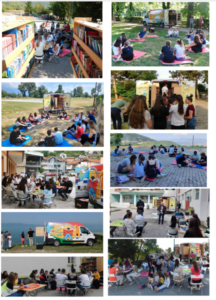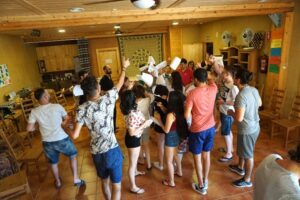Almost one year ago, we published a special issue on the activities that were carried out during 2021 in the frame of the project READ – Regional Network for Cultural Diversity – funded by the European Commission and implemented under the leadership of Goethe Institut – Skopje, in collaboration with five partner organizations: Instituti i Librit dhe i Promocionit (Albania), Krokodil (Serbia), Kalem Culture Association (Turkey), LOJA Center for Balkan Cooperation (North Macedonia), and Qendra Multimedia (Kosovo). The issue we are publishing is dedicated to the continuation of READ in 2022.
During this period, the pandemic came practically to an end. Meanwhile, other calamities fell upon the world, some of them unexpected, some others not. The war waged by the autocrat of Kremlin in Ukraine, with the threat of turning it into a global conflagration, while a ramification of the conflict is already a looming danger for our region. The concomitant advance of fascist or fascistoid parties and movements in supposedly eternal democracies (even in Sweden!); as Thomas Mann and Albert Camus, independently from each other, said at the end of the last World War, fascism is defeated, but not dead, and it will probably reappear, although in other forms; unfortunately, the times are proving them right. And in the meantime the climate crisis of our planet is only getting worse… Now, does this terrible fact justify throwing tomato soup on a painting by Van Gogh, or mashed potatoes on one by Claude Monet, or sticking one’s head on one by Vermeer? The activists that perpetrated the first of these acts were justifying themselves by a false disjunction: “What is more valuable, art or human life?” They seem to forget or ignore that many human beings risked their own lives during the last World War in order to save such pieces of art from Nazi robbery.
Indeed, what is the place of culture today, in the dark times that seem to be approaching? Is it a luxury? If so, it is not explainable why the totalitarian regimes treat it as an existential threat. Stalin, Hitler and Mao intended to devoid culture from its creative spirit by converting it into a powerful instrument of propaganda; others, like Pol Pot and the Taleban, forbid it altogether and annihilated all heritage. However, their common denominator can be best expressed by a sentence attributed to Goebbels, the Nazi minister of Propaganda: “When I hear the word ‘culture’, I reach for my pistol”. And, if culture is a luxury, it is not explainable why, during the siege of Sarajevo, when the city was being shelled by heavy artillery, its dwellers were eagerly organizing theatre and movie performances, opening art exhibitions and trying to obtain books with an effort similar to the one by which they were trying to overcome the shortages of primary necessity supplies.
Adorno said that it is impossible to write poetry after Auschwitz. By subverting his statement, we would say that, in front of calamities, it is impossible not to do it. Therefore, let’s READ again! (But we shouldn’t forget the possibility that the next year might be worse than this one).

This publication was produced with the financial support of the European Union. Its contents
are the sole responsibility of the respective authors (including the editorial texts, which are the
responsibility of the editorial team), and do not necessarily reflect the views of the European Union.





